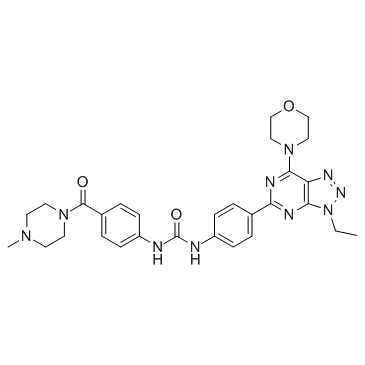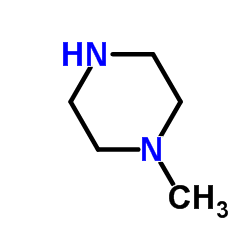PKI-402

PKI-402 structure
|
Common Name | PKI-402 | ||
|---|---|---|---|---|
| CAS Number | 1173204-81-3 | Molecular Weight | 570.646 | |
| Density | 1.4±0.1 g/cm3 | Boiling Point | N/A | |
| Molecular Formula | C29H34N10O3 | Melting Point | N/A | |
| MSDS | N/A | Flash Point | N/A | |
Use of PKI-402PKI-402 is a selective, reversible, ATP-competitive inhibitor of PI3K, including PI3K-α mutants, and mTOR (IC50=2, 3, 7,14 and 16 nM for PI3Kα, mTOR, PI3Kβ, PI3Kδ and PI3Kγ). |
| Name | 1-[4-(3-ethyl-7-morpholin-4-yltriazolo[4,5-d]pyrimidin-5-yl)phenyl]-3-[4-(4-methylpiperazine-1-carbonyl)phenyl]urea |
|---|---|
| Synonym | More Synonyms |
| Description | PKI-402 is a selective, reversible, ATP-competitive inhibitor of PI3K, including PI3K-α mutants, and mTOR (IC50=2, 3, 7,14 and 16 nM for PI3Kα, mTOR, PI3Kβ, PI3Kδ and PI3Kγ). |
|---|---|
| Related Catalog | |
| Target |
PI3Kα:2 nM (IC50) PI3Kα-H1047R:3 nM (IC50) PI3Kα-E545K:3 nM (IC50) PI3Kβ:7 nM (IC50) PI3Kδ:14 nM (IC50) PI3Kγ:16 nM (IC50) mTOR:3 nM (IC50) |
| In Vitro | PKI-402 is an equipotent inhibitor of class I PI3K, including the E545K and H1047R PI3K-α mutants (IC50=2, 3 and 3 nM for PI3Kα, PI3Kα-H1047R and PI3Kα-E545K, respectively). PKI-402 causes in vitro growth inhibition of human tumor cell lines derived from a diverse set of human tumor tissues, including breast, brain (glioma), pancreas, and non-small cell lung cancer (NSCLC) tissues. PKI-402 inhibits MDA-MB-361 [breast: Her2+ and PIK3CA mutant (E545K)], with an IC50 of 6 nM. PKI-402 inhibits HCT116 (K-Ras and PIK3CA mutant) with an IC50 of 33 nM[1]. |
| In Vivo | PKI-402 displays antitumor activity (i.v. route) in breast [MDA-MB-361: Her2+ and PIK3CA (E545K)], glioma (U87MG and PTEN), and NSCLC (A549; K-Ras and STK11) xenograft models. PKI-402 causes regression in the MDA-MB-361 xenograft model. PKI-402 effect is most pronounced at 100 mg/kg (daily for 5 days, one round), which reduces initial tumor volume and prevents tumor re-growth for 70 days. In MDA-MB-361 tumor tissue, PKI-402 at 100 mg/kg (single dose) fully suppresses p-Akt at both the T308 and the S473 sites at 8 hours and induces cleaved PARP. At 24 hours, p-Akt suppression is still evident, as is cleaved PARP[1]. |
| Kinase Assay | Enzyme assays are done in fluorescent polarization (FP) format. Human class I PI3Ks and PI3K-α mutants (E545K and H1047R) are produced in Sf9. GST-GRP1 (murine) is produced in Escherichia coli and isolated by GST-Sepharose. Assay buffers are reaction buffer [20 mM HEPES (pH 7.1), 2 mM MgCl2, 0.05% CHAPS, and 0.01% β-mercaptoethanol] and stop/detection buffer [100 mM HEPES (pH 7.5), 4 mM EDTA, 0.05% CHAPS]. FP reaction is run for 30 min at room temperature in 20 μL of reaction buffer containing 20 μM phosphatidylinositol 4,5-bisphosphate (PIP2), 25 μM ATP, and <4% DMSO (compound solvent). FP reaction is stopped with 20 μL of stop/detection buffer (10 nM probe and 40 nM GST-GRP), and after 2 h, data are collected. Selectivity of PKI-402 is evaluated in the 236 human kinase panel at [ATP]=Km for each enzyme[1]. |
| Cell Assay | MDA-MB-361, MDA-MB-468, T47D, MCF7, BT474, HT29, HCT116, DLD1, U87MG, H157, NCI-H460, A549, NCI-H1975, NCI-H1650, NCI-H2170, KB, 786-0, A498, MIA-PaCa-2, and PC3 cell lines are propagated at 37°C in 5% CO2 incubators in supplier-recommended growth medium. Cell growth inhibition is determined using the CellTiter 96 AQueous proliferation assay. Data are collected after 72 h using a Wallac Victor2 V 1420 multilabel HTS counter. FOXO-GFP translocation in U2OS cells is quantified after 60-min PKI-402 exposure using a Cellomics ArrayScan VTI Reader[1]. |
| Animal Admin | Mice[1] PKI-402 or vehicle is administered by i.v. route. Nude mice bearing MDA-MB-361 tumors are used. Tumor weight is calculated. Pharmacodynamic (biomarker) measurements are done on tumor-bearing female nude mice administered PKI-402. Tumor or normal tissue samples are collected from euthanized animals, homogenized, washed twice with cold (4°C) PBS, and then treated with cell lysis buffer[1]. |
| References |
| Density | 1.4±0.1 g/cm3 |
|---|---|
| Molecular Formula | C29H34N10O3 |
| Molecular Weight | 570.646 |
| Exact Mass | 570.281555 |
| PSA | 133.64000 |
| LogP | 0.25 |
| Index of Refraction | 1.723 |
| Storage condition | -20℃ |
|
~76% 
PKI-402 CAS#:1173204-81-3 |
| Literature: Dehnhardt, Christoph M.; Venkatesan, Aranapakam M.; Delos Santos, Efren; Chen, Zecheng; Santos, Osvaldo; Ayral-Kaloustian, Semiramis; Brooijmans, Natasja; Mallon, Robert; Hollander, Irwin; Feldberg, Larry; Lucas, Judy; Chaudhary, Inder; Yu, Ker; Gibbons, Jay; Abraham, Robert; Mansour, Tarek S. Journal of Medicinal Chemistry, 2010 , vol. 53, # 2 p. 798 - 810 |
| Precursor 1 | |
|---|---|
| DownStream 0 | |
| PKI-402 |
| 1-{4-[3-Ethyl-7-(4-morpholinyl)-3H-[1,2,3]triazolo[4,5-d]pyrimidin-5-yl]phenyl}-3-{4-[(4-methyl-1-piperazinyl)carbonyl]phenyl}urea |
| Urea, N-[4-[3-ethyl-7-(4-morpholinyl)-3H-1,2,3-triazolo[4,5-d]pyrimidin-5-yl]phenyl]-N'-[4-[(4-methyl-1-piperazinyl)carbonyl]phenyl]- |
| 1-[4-(3-ethyl-7-morpholin-4-yl-3H-[1,2,3]triazolo[4,5-d]pyrimidin-5-yl)phenyl]-3-{4-[(4-methylpiperazin-1-yl)carbonyl]phenyl}urea |
| pound not PKI402 pound not PKI 402 |

